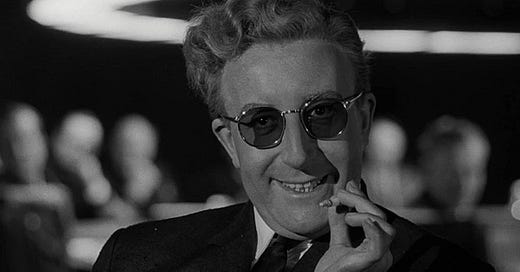“Mein Fuhrer…I can walk!”
This is the last line of Dr. Strangelove: Or How I Learned to Stop Worrying and Love the Bomb (1964). What does it mean?
Peter Sellers is Dr. Strangelove, former Nazi scientist (original name: Merkwürdigliebe) who is now the chief strategist for the United States nuclear arsenal. (Sellers also plays the president and a British Group Captain on an air bomber base).
The film is titled Dr. Strangelove, but that character only really emerges in the last twenty minutes or so, and takes center stage. He pops up earlier but is mostly off to the side. Eventually he takes over…almost inevitably, the former Nazi ends up dictating what happens. And this is the meaning of the subtitle: How I Learned to Stop Worrying and Love the Bomb—the bomb means fascism. Everyone ends up learning how to love Dr. Strangelove, the former Nazi scientist—to accept that fascism has won. That is the message of the film—it is about the triumph of fascism. Yet it is also a comedy, not a tragedy. As Dr. Strangelove describes the Doomsday Machine which will destroy the world, he does it with a gleam in his eye, and a growing smirk—it’s terrible evil but he finds it hilarious. This is the genius of his performance, dictating the end of the world in an irresistibly funny way.
In this way the film is somewhat pro-fascist—that the world is so absurd, fascism will win, because fascism is the ultimate absurdity. The world is too insane for any other outcome. The subtitle advises us to stop worrying and learn to love it—learn to love this absurd world where fascism wins. The plot is somewhat complex, and I won’t go into it, but basically an unhinged American Brigadier General named Jack D. Ripper (Sterling Hayden) gives a command to his bomber to drop a hydrogen bomb on the Soviet Union, based on nothing. Ripper is obsessed with the idea of manly fluids needing to be conserved…and very wary of fluoridation taking over. He has these paranoid conspiracy beliefs that would fit in quite well in the 2020s. And that’s what brings about the dropping of the bomb—it’s as absurd as it gets. Could it happen any other way? Dr. Strangelove guides us through the process of accepting this absurdity, and learning to love it.
Dr. Strangelove spends the film in a wheelchair, but as the film is ending, and he gets fired up talking about his various schemes, he gains strength. He keeps calling the president “mein Fuhrer.” He keeps raising his arm in a Nazi salute, but he pushes it down with his other arm. This is one of the more famous bits in the movie, and is extremely hilarious. Sellers’ German accent is amazing too. At the very end, Dr. Strangelove manages to get up and walk: “Mein Fuhrer, I can walk!” He doesn’t correct himself and say president instead of Fuhrer—at that point he doesn’t need to. He can walk now, fascism is unleashed, it is triumphant, it is moving forward. That’s how it ends—the Nazi scientist who advised the US president from the shadows emerges to take the lead.
The message of the film could not be clearer—fascism won. But despite this, the film is not somber or heavy, it is not overtly trying to deliver a serious moralizing message. This brings us to the question—is the film pro or anti fascist? I think it’s beyond those stupid, juvenile categories, which define everything today. Now, art is expected to be clearly anti-fascist, stridently so, or else the artist gets canceled. In 1964, you could make a movie that depicted the triumph of fascism, in a lighthearted way—not necessarily celebrating it, but not condemning it either.
There’s an air of absurdity to everything in the film—all the characters, from Brigadier General Jack D. Ripper, to General Buck Turgidson, to Major King Kong and Colonel Bat Guano—are cartoonish. And Dr. Strangelove is the most cartoonish of all—as well as the evilest. This is how the world is—absurd people causing evil things to happen. In an absurd world, the most absurd thing will happen—and fascism is the most absurd thing of all. So of course, that is what the future will be defined by. What is there to do except stop worrying and love it?





Would be interested to hear your thoughts on Lolita, if you haven’t already written about it. Another film that depicts, in a light tone and without explicit condemnation, something that is generally understood to be horrific.
Fascism won, but there's limited space in the mine shafts for the remnants.